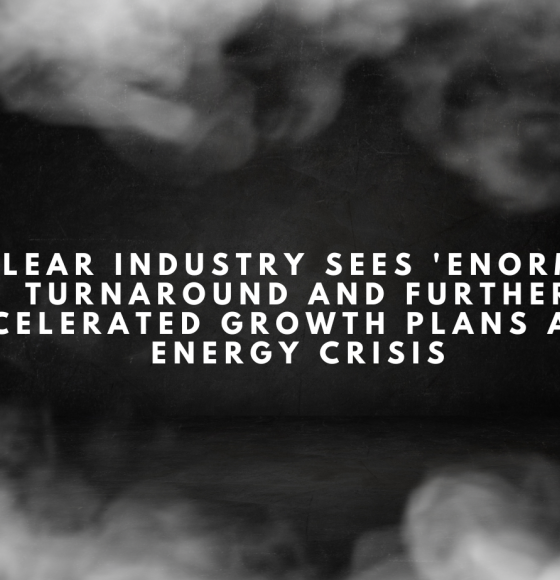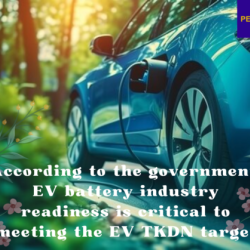LONDON
The director general of the World Nuclear Association told Anadolu in an exclusive interview that the nuclear energy industry has seen a enormous turnaround in recent years and that plans for further growth around the world have accelerated with the energy crisis as energy security has become the top priority for countries. By 2040, nuclear power capacity worldwide is expected to expand to 931
gigawatts, a 2.5-fold increase from current levels, according to Sama Bilbao y Leon. According to the World Nuclear Association most recent report, there are currently 391 gigawatts of nuclear generating capacity available. The reference scenario in the paper predicts capacity to reach 686 gigawatts by 2040, while the highest scenario calls for capacity to reach 931 gigawatts. These estimates show an increase from the report 2021 edition of 71 gigawatts in the reference scenario and 92 gigawatts in the top scenario. Countries came to the realization that including some nuclear energy into their mix was necessary if they were to reach their net zero commitments. But plans for the industry expansion quickened in response to the energy crisis, according to Bilbao y Leon. While decarbonization was important, particularly in the Global North, she added that since the energy crisis, energy security had gained importance. Due to extremely low natural gas supplies from its primary supply source, Europe experienced an energy crisis following Russia war in Ukraine and the sanctions imposed on it by Western nations. While the repercussions of the energy crisis are still being felt, Europe is making an effort to switch from renewable to nuclear energy. For this reason, a lot of nations who have been using nuclear power have
chosen to keep extending the life of their current fleet for as long as is practical. Europe as a whole is increasing its capacity, according to Bilbao y Leon. By extending the lifespan of one of its reactors at two nuclear power facilities by ten years, Belgium became one of the nations postponing its intentions to phase out nuclear power by 2025. The majority of European countries intend to both increase and continue using nuclear electricity, despite the widespread knowledge of Germany nuclear phaseout. Among the nations with intentions for future expansion are the UK, France, Sweden, Netherlands, Czech Republic, Slovakia, Romania, Estonia, Slovenia, and Croatia, according to Bilbao y Leon. The European Commission ambitions to create an Industrial Alliance devoted to small modular reactors in early 2024 and its goals of increasing nuclear capacity by 50% by 2050 have supported these countries shift to
nuclear electricity. Explaining the procedure as an enormous turnaround in the nuclear sector, she pointed out that this is the case not only in Europe but in many other 1st wave of new power plants to be operational by 2030 With 61 nuclear power stations under construction worldwide, Bilbao y Leon announced that a first wave of new nuclear projects will be online by 2030. While many of the projects in this first wave are in Europe, including Türkiye with the Akkuyu Nuclear Power Plant, some are in North America." Next year is when we anticipate Akkuyu first unit to begin operations. The other units will follow up soon on this excellent development, according to Bilbao y Leon. It is my belief that we anticipate having all four operational by 2030. I think there
are still more development initiatives in Turkey. Akkuyu is the country first nuclear power plant, with a capacity of 4.8 gigawatts
in four units. Turkish Energy and Natural Resources Minister Alparslan Bayraktar announced plans to have over 20 gigawatts of nuclear energy capacity in the country by the end of 2050. Nuclear industry access to affordable finance is critical. According to Bilbao y Leon, the financial community will start lending significantly more cheaply to the nuclear business after the planned and ongoing projects are completed and show that the nuclear industry can deliver on time and budget. Since nuclear programs require significant capital outlays, access to reasonably priced funding is crucial. The financial sector now believes that nuclear projects could be financially hazardous. This explains why the weighted average cost of capital is comparatively high. I believe that when nuclear plants begin to show signs of success, the weighted average cost of capital will decrease by nearly half to the level that solar and wind projects are currently experiencing. Additionally, she predicts that increased funding for uranium mining, combustion enrichment, and fuel fabrication programs will lead to the expansion of nuclear supply chains. She did, however, acknowledge that 25% of global enrichment capabilities are concentrated in Russia, a concern for the Global North that prefers not to depend on Russian products and services. In order to become as self-sufficient as feasible, it is the reason why North America and Europe are already seeing a lot of investment, according to Bilbao y Leon. She stressed that the nuclear business would already be independent again in five years due to the technology global reach, which includes experts, industrial facilities, and suppliers, even if investment would be necessary if there was a wish to stop using Russian nuclear services globally. As North America and Europe do not want to rely on Russian technology or
services in any industry, we do not foresee that there will be nuclear power plants that are Russian in these markets, Bilbao y Leon stated. However, some regions, such as Africa, are eager to develop nuclear energy as a practical alternative. China, Russia, or South Korea can contribute to these areas with cash and technology within their capacity.

















